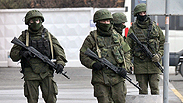
UN Security Council holding urgent meeting on Ukraine crisis
Russian parliament authorizes Putin's request to use military. Demonstrators clash as Russian troops descend on Crimea.
The United Nations Security Council are holding a closed door meeting for the second consecutive day to discuss the current situation in Ukraine.
The council also held closed door consultations on Friday at the request of Ukraine's UN Ambassador Yuriy Sergeyev who referred to "the deterioration of the situation" in the Crimean Peninsula which he said "threatens the territorial integrity of Ukraine."
Related stories:
- Russian parliament authorizes Putin's request to use military in Ukraine
- Russian troop movements in Crimea may destabilize Ukraine
- Armed men seize two airports in Ukraine's Crimea, Yanukovich reappears
Russia's parliament approved a motion to use the country's military in Ukraine after a request from President Vladimir Putin as protests in Russian-speaking cities turned violent Saturday, sparking fears of a wide-scale invasion.
The motion follows President Barack Obama's warning Friday "there will be costs" if Russia intervenes militarily, sharply raising the stakes in the conflict over Ukraine's future and evoking memories of Cold War brinkmanship.
"I'm submitting a request for using the armed forces of the Russian Federation on the territory of Ukraine pending the normalization of the socio-political situation in that country," Putin said in his request sent to parliament.
Russia's upper house also recommended that Moscow recalls its ambassador from Washington over Obama's comments.
Ukraine had already accused Russia on Friday of a "military invasion and occupation" in the strategic peninsula of Crimea where Russia's Black Sea fleet is based. Ukrainian Prime Minister Arseny Yatsenyuk called on Moscow "to recall their forces, and to return them to their stations," according to the Interfax news agency. "Russian partners, stop provoking civil and military resistance in Ukraine."
As a permanent member, Russia has veto power on any council resolution.
Ignoring Obama's warning, Putin said the "extraordinary situation in Ukraine" was putting at risk the lives of Russian citizens and military personnel stationed at a naval base that Moscow has maintained in the Black Sea peninsula since the Soviet collapse.
Putin's motion loosely refers to the "territory of Ukraine" rather than specifically to Crimea, raising the possibility that Moscow could use military force in other Russian-speaking provinces in eastern and southern Ukraine, where many oppose the new authorities in Kiev. Pro-Russian protests were reported in the eastern cities of Kharkiv, Donetsk and Luhansk and the southern port of Odessa.
In Saturday's parliamentary session in Moscow, a deputy house speaker said Obama had insulted Russia and crossed a "red line," and the upper house recommended the Russian ambassador in Washington be recalled. It will be up to Putin to decide whether that happens.
EU foreign policy chief Catherine Ashton said the decision by the Russian parliament to authorise the use of Russian forces in neighbouring Ukraine was an unwarranted escalation of tensions.
"I therefore call upon the Russian Federation not to dispatch such troops but to promote its views through peaceful means," Ashton said in a written statement on Saturday.
Ashton added that she would meet with Russian Foreign Minister Sergei Lavrov after Monday's extraordinary meeting of EU foreign ministers to discuss the bloc's response to the situation in Ukraine.
Earlier Saturday, dozens of people were hurt in clashes when pro-Russia activists stormed the regional government's headquarters in the eastern Ukrainian city of Kharkiv and raised the Russian flag, local media said.
The UNIAN news agency said thousands of people had gathered outside the building during a protest against the country's new leaders who ousted President Viktor Yanukovich a week ago.
The violence signaled that Ukraine's new leaders could face a challenge in mainly Russian-speaking regions that oppose the largely pro-Western course charted by the newly installed government.
The leaders of Crimea, a Black Sea peninsula with an ethnic Russian majority that is home to a Russian naval base, say they have joined forces with Russian servicemen to exert control over key buildings.
Protests against the new authorities also took place on Saturday in other cities, including Odessa, Dnipro and Donetsk, Yanukovich's home town and power base.
The Russian flag was raised over the regional government building in Donetsk by several thousand pro-Russia activists waving the Russian tricolour and chanting "Russia! Russia!, witnesses said.
Donetsk authorities issued an appeal for a referendum to be called on the future status of the region.
The crisis was sparked when Ukraine's deposed president, Victor Yanukovych, ditched a deal for closer ties to the European Union and instead turned toward Moscow. Months of protests followed, culminating in security forces killing dozens of protesters and Yanukovych fleeing to Russia.
Ukraine's population is divided in loyalties between Russia and Europe, with much of western Ukraine advocating closer ties with the European Union while eastern and southern regions look to Russia for support. Crimea, a semi-autonomous region of Ukraine, is mainly Russian-speaking.
In Crimea, the pro-Russian prime minister who took office after gunmen seized the regional Parliament claimed control of the military and police there and asked Putin for help in keeping peace, sharpening the discord between the two neighboring Slavic countries.
Ukraine's acting president, Oleksandr Turchynov, said the election of Sergei Aksyonov as prime minister of Crimea was invalid.
Ukrainian officials and some Western diplomats said that a Russian military intervention is already well underway after heavily armed gunmen in unmarked military uniforms seized control of local government buildings, airports and other strategic facilities in Crimea in recent days.
Crimea only became part of Ukraine in 1954 when Soviet leader Nikita Khrushchev transferred jurisdiction from Russia, a move that was a mere formality when both Ukraine and Russia were part of the Soviet Union. The Soviet breakup in 1991 meant Crimea landed in an independent Ukraine.
Reuters and AP contributed to this report.










